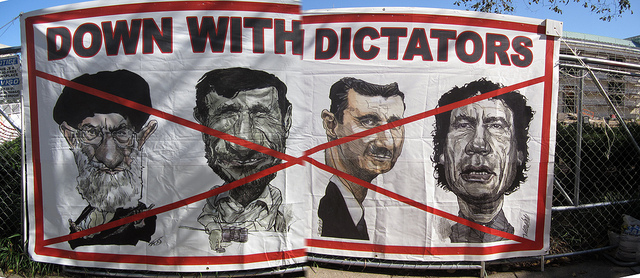Numerous mutually reinforcing factors are combining to push democracy into worldwide decline
Democracy is in a profound state of crisis, writes Joshua Kurlantzick, and is in retreat in many parts of the world. Here he outlines the implications of this worrying trend, which could include the proliferation and return of authoritarian governments. However, even in established democracies, democracy is losing favour with the middle classes which sustain it.
Over the past three years, the world’s imagination has been captured by the outbreak of political openings in some of the most repressive societies on earth. In Myanmar – where only five years ago the military government ordered the shooting of Buddhist monks in the streets – the past two years have seen a formal transition to a civilian government. In Tunisia, Egypt, Libya, and potentially Syria, longtime autocrats were toppled by popular revolutions. Yet these events are a smokescreen. In reality democracy is actually going into reverse worldwide.
Democracy’s meltdown
While some nations in Africa, the Arab world, and Asia have slightly opened up over the past two years, countries that were once held up as examples of political change have experienced democratic meltdowns. In its most recent annual international survey, Freedom House had found that global freedom dropped in 2012 for the sixth year in a row. The same is likely to be true for 2013. At the same time, most authoritarian nations have become more repressive. Freedom House noted that this was most pronounced among what it calls the “middle ground” nations, a group of states located primarily in the developing world that have begun democratizing but are not solid democracies. This truculence was only made stronger by the Arab Spring, which prompted autocratic regimes like China to crack down harder on their own populations, and resulted in rollbacks in Arab countries themselves. Indeed, the International Federation for Human Rights – an organization that monitors abuses around the world – found in its annual report that the Arab uprisings have had little impact on a dire, deteriorating climate for human rights defenders worldwide.
Yet, democracy has, in fact, been in hibernation since the turn of the century. According to Freedom House, the period between 2000 and 2005 was one in which democracy gained little ground around the world, before sliding backward after the mid-2000s. “Since they were first issued in 1972, the findings in Freedom in the World have conveyed a story of broad advances,” Freedom House has reported. “But freedom’s forward march peaked around the beginning of the [2000s].”
Don’t just take Freedom House’s word
Even as some democrats were celebrating the Arab Spring, and hoping that, as in 1989, its revolutions might spread to other parts of the world, a mountain of other evidence supported Freedom House’s gloomy conclusions. One of the other most comprehensive studies of global democracy, compiled by Germany’s Bertelsmann Foundation, uses data examining democracies’ ability to function, manage government, and uphold freedoms, to produce its Transformation Index. According to the most recent version the overall quality of democracy has eroded throughout the developing world, whereas the key components of functioning democracies have suffered qualitative erosion. These developments threaten to hollow out the quality and substance of governance.
Old-fashioned coups have also made a comeback. Between 2006 and 2013, the military grabbed power in Guinea, Honduras and Fiji, as well as countless other states that were synonymous with coups in the 20th century. And where the military could not seize control by force – such as Ecuador, Mexico and Pakistan – it nevertheless managed to restore its status as the central actor in political life. Across the Middle East, armed forces have also come to dominate the Arab spring and summer, putting the lie to the idea that the uprisings were going to bring democracy to the region. Instead, in the Arab uprisings appear to be entrenching the power of militaries in the region, most notably Egypt.
Accordingly, the strengthening of military rule in many developing states has been disastrous for reform, despite the militaries’ contention that they are the only institutions standing in the way of civil strife or Islamist rule. Indeed, human rights groups such as Amnesty International found that, since the winter of 2010-2011, human rights abuses have actually increased in nearly every Middle Eastern state.
Further south
Despite the fact that militaries could hardly be called agents of reform, in many developing nations they have quite often continued to receive support from the middle classes. This is because they regard the armed forces as potential antidotes to a popular democracy that might empower the poor, the religious, and less-educated. In my analysis of military coups in developing countries over the past twenty years, it was determined that middle classes men either agitated in advance for the coup or used various outlets to voice support for the military in almost 50% of all cases.
Moreover, opinion polls in many developing countries suggest that not only is the quality of democracy declining but also that public perceptions of it are also deteriorating. The regular Afrobarometer survey, for example, reveals declining levels of support for democracy throughout much of sub-Saharan Africa. It’s pretty much the same story in Central Asia. And Latinobarometro polls show similar dissatisfaction with democracy across South and Central America. In states like Honduras, Nicaragua and Peru, an ever dwindling majority of people think democracy is preferable to any other type of government. Instead, many Latin Americans now think that they do not even have a functioning democracy.
Compare and contrast
By contrast, democratic governments often make choices that foster broader development and stability. Take child mortality, for instance – one of the best indicators of whether a country is prioritizing health care and social welfare. Political scientists Thomas Zweifel and Patricio Navia have studied different types of regimes and rates of infant mortality throughout the world in order to determine a governments’ specific focus on well-being. They found that, almost without exception, democracies made more of their inhabitants better off than did dictatorships. Perhaps then, it is not a surprise that, taken on average, residents of democracies live longer than those living under authoritarian regimes.
Democracies also tend to work together better to promote international security. At the UN Security Council, democracies have over the past decade been more than three times more likely to vote with the United States on any resolution than authoritarian nations. This roughly matches voting patterns in the broader UN and at the UN Human Rights Council. In marked contrast, disillusionment with democracy has led citizens of many developing states to opt out of the political process, a decision which often has severe ramifications for security and stability.
Yet, even in developing nations where democracy has deeper roots, disillusionment with politics and democratically elected leaders, has exploded in recent years. Disillusionment here is often attributed to politicians’ inability to respond to global and national economic crises with nothing but biting austerity measures. In extreme cases, disillusioned citizens have joined anti-democratic, militant mass movements such as Greece’s Golden Dawn, Myanmar’s 969 Movement, or Thailand’s PAD. These groups have often sparked inter-communal riots and encouraged violent acts against minorities. They have also tried to sabotage the political process by pushing for a coup or other anti-democratic transfer of power.
Yes, democracy is ruling in a bad state these days.
—
Note: This post originally appeared on the ISN late last year. It represents the views of the author and not those of Democratic Audit or the LSE. Please read our comments policy before posting.
—
 Joshua Kurlantzick is Senior Fellow for Southeast Asia at the Council on Foreign Relations (CFR) and author of the book Democracy in Retreat: The Revolt of the Middle Class and the Worldwide Decline of Representative Government.
Joshua Kurlantzick is Senior Fellow for Southeast Asia at the Council on Foreign Relations (CFR) and author of the book Democracy in Retreat: The Revolt of the Middle Class and the Worldwide Decline of Representative Government.






 Democratic Audit's core funding is provided by the Joseph Rowntree Charitable Trust. Additional funding is provided by the London School of Economics.
Democratic Audit's core funding is provided by the Joseph Rowntree Charitable Trust. Additional funding is provided by the London School of Economics.
Democracy is not at all ascendant, but is in worldwide decline. It must be vigorously defended, again, as ever. https://t.co/poucoSBWX3
Numerous mutually reinforcing factors are combining to push democracy into worldwide decline https://t.co/poucoSBWX3 Joshua Kurlantzick
Numerous mutually reinforcing factors are combining to push #democracy into worldwide decline https://t.co/m8eNRoPmH3 https://t.co/ASr814SCNq
RT @democraticaudit: Numerous mutually reinforcing factors are combining to push democracy into worldwide decline https://t.co/kg2tmFHOyp ht…
“mutually reinforcing factors are combining to push democracy into worldwide decline https://t.co/sXWKBc5Gsf” @JohnAFlood @DavidCh27992090
Numerous mutually reinforcing factors are combining to push democracy into worldwide decline https://t.co/O2FLWaX4g9
Numerous mutually reinforcing factors are combining to push democracy into worldwide decline https://t.co/hAT4kvPDLv